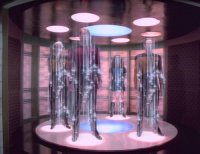 I am frequently guilty of ranting, panic, and gross hyperbole on this blog. I get carried away with some ideas, especially political ones, and make a bigger noise than is in any way warranted. I’m not sorry: This is my blog and I’ll rant if I want to, because it’s fun.
I am frequently guilty of ranting, panic, and gross hyperbole on this blog. I get carried away with some ideas, especially political ones, and make a bigger noise than is in any way warranted. I’m not sorry: This is my blog and I’ll rant if I want to, because it’s fun.
In my opinion, this post is not hyperbole and not a rant:
In my considered opinion, I honestly believe that I have just watched the dawn of a new age.
WARNING: This video is blurry footage of a wizened old physicist with lots of charts and diagrams and high-energy-physics jargon. If you’re not into the physics (which are seriously funky if you are into that kind of thing) then the ramifications of this system are beautifully summed up in the ten minutes from 59:30 to 1:10:00, and the practical considerations and somewhat embarrassing politics of the matter are well discussed in the questions after 1:10:00.
For those disinclined or unable to do the streaming-video thing for ten minutes, I would sum it up thus:
Dr Robert Bussard’s research group have been looking at a lateral approach to the magnetically confined fusion problem for the past eleven years. They have been doing this in a DARPA-funded laborotory in relative secrecy because their approach is practical, feasible and relatively cheap, making it anathema to the dual vested interests of conventional Tokamak-based fusion research and fossil-fuel economics.
Their system uses a spherical magnetic containment field to produce a clean (radiation free) fusion reaction, without molten lithium or multi-billion dollar building-sized toroids.
The important point of the video is that they’ve already done it. They made it work in a machine the size of a domestic oven, on a shoestring budget, with a team of five people.
Some weeks ago, when I started reading Wizard: The Life and Times of Nikola Tesla I was struck by the attitude of the great minds of the time, one which saw physical science as malleable and controllable, a field in which one brilliant idea in one ordinary human mind in one brief human lifetime could reshape the world.
This attitude, I recall saying to PFH at the time, is something which seems to be missing in modern science: That kind of glory is seen as being firmly beyond the reach of individuals, or even individual research groups. Everything is to be refined and tested in infinitesimal steps, and there will never be another great revolution like Tesla’s AC power system, or so our scientific community is expected to believe.
Seeing this talk has convinced me that I was wrong, or at least partly wrong. A lot of Dr. Bussard’s concluding comments say exactly the same thing: he’s been closeted with his research group behind closed doors for eleven years, and now it’s very rare to find anyone experienced in this kind of science.
I was wrong though, because Bussard and his team exist. As he says during the questions, somewhere, somehow, the concluding research is being done. A viable fusion power source is being perfected, and I will probably live to see it come to fruition.
It’s hard to be calm in the face of such things.




 You’re a theoretical scientist. You have a complex theory, or theories, from the edge of your field, which synthesize breakthroughs in several adjacent fields. You don’t know enough about the neighbouring fields to really properly test this theory yet though, and neither does any other individual human being. So, you go round the leading minds in those fields, and borrow their life-recordings for their latest twenty years work, including all of their own postgraduate study. You upload it all. Now, suddenly, you’re an expert in all of those fields. Not only do you have all the underpinnings your theory could ever need, you now have the practical experience to empirically test it too.
You’re a theoretical scientist. You have a complex theory, or theories, from the edge of your field, which synthesize breakthroughs in several adjacent fields. You don’t know enough about the neighbouring fields to really properly test this theory yet though, and neither does any other individual human being. So, you go round the leading minds in those fields, and borrow their life-recordings for their latest twenty years work, including all of their own postgraduate study. You upload it all. Now, suddenly, you’re an expert in all of those fields. Not only do you have all the underpinnings your theory could ever need, you now have the practical experience to empirically test it too.
